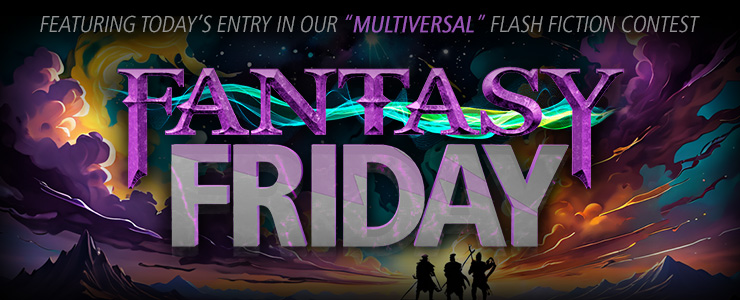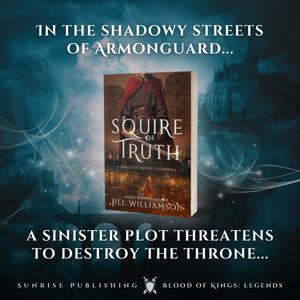By Joyce Flanagan
They said when the lights grow bright in the north sky, the great wolves are on the hunt. Tonight, the Naka were only a faint stroke of green across the blackness above. I watched them, the cold breeze a welcome relief from the stuffy dugout I’d been sheltered in. I hummed my song softly to myself, my hand hovering over the strings of my ukulele hanging over my shoulder. I composed the notes with ease, but the words wouldn’t come.
I fell silent, gritting my teeth. The song would be sung at the central hall when the Naka were brightest, and all the fathers of nations were gathered. I would tell them the message of the lights, but it needed the right words.
I had failed them already. I missed the turn to the river path when the mist rose and was lost. But I met something, I don’t remember what, which led me through the woods until I found the Great One’s Circle. There I found shelter only in exchange for my music. But since when…?
A knock and a hum broke my concentration. I started and looked around. What was I doing? The sound came from a wooden cage in the center of the Circle. It held a young boy. He pulled against his chains, staring at me with bright yellow eyes.
Walking toward him, I tried for a smile before crouching to look at him at eye level, my instrument settling in my lap. He had a clean face but was wearing stained rags far too large for his slight frame. His thick grey hair stuck up in all directions.
“Are you all right, boy?” I whispered, glancing about me. The Circle was quiet except for muffled laughter and shouts from the great hall behind me—revelry I’d been called to join.
“You said you would help me, Harmony,” he whimpered. The light in his eyes was dim. My chest pounded. I didn’t know why he was caged, but our hosts weren’t kind. Freeing him would mean death for us both.
I took a quick breath. “When did I say this?” I didn’t remember telling him my name, either.
“Last night and the night before,” he said, leaning against the wooden bars, body and arms limp.
My eyes stung. I sank to the dirt. In the distance I could hear the great wolves howl, and goosebumps raised on my arms.
“I’m—I’m sorry,” I whispered, insides twisting. I couldn’t keep failing to help him. I studied the thick rope that held the cage shut, twisted into so many knots I would bloody my hands before I could untie it. I met his eyes, then looked between him and the great hall. The Great One trusted no one—he had taken my knife.
The Naka were hidden now by clouds, and the words seemed farther than ever.
The boy reached his hand out, and I took it.
“If you can release me from this cage, I will help us escape,” he promised.
I gripped the neck of my ukulele, uncertain. But a new glow in his eyes gave me courage.
“I’ll release you,” I said, giving him a grin. We might not survive the plan that tentatively played in my head, but on the other hand, we might. I had to act now.
I inhaled, walked back toward the great hall and entered the revelry. There was one thing I could do. My fingers found their place on the frets of my ukulele, and I began to play a song. It was from the old days, about the great wolves who walked with men.
The music was met with cheers and splashes of drink, though the noise settled as I continued. All eyes were on me, as I intended. I told them of the wolves as wise as men, who taught us as we taught them. This hall had never heard such a song, yet in their disbelief they listened.
I danced as I played, bowing and swaying to the beat of the song. This amused some, though there was no smile yet on the Great One’s face.
Then I tripped on the edge of a table and sent its contents crashing to the ground alongside me. I caught myself partially with one hand, which stung, while the other protected my instrument, and my knees knocked into the hard dirt ground. Breathless, I slipped my hand from my ukulele and grasped what I desired.
I came up with a laugh and a loud cheer, bowing to the Great One. Now he guffawed, obviously too drunk with wine to recognize any fault. All around me, his folk cheered alongside him.
I laughed also, stowing the knife up my sleeve. I sang again as I backed out of the abode. They asked me to play on. I could not, saying their wine would only taste more sour. They paused, looking at one another in confusion, so I ducked out.
I ran across the circle and crouched by the cage. Folk passed by, so I sat still, holding my breath until they turned away from the cage. Then I started cutting the rope while he began to grin. The rope snapped.
“Run with me,” he said.
I grabbed his hand, and he pulled me along. I could barely keep up. I felt his hand change in mine, and claws soon pressed into my palm, startling me into jerking away. The drunken cries of the Great One and his men followed behind us.
Now striding on all fours, he suddenly stopped and turned slowly. He stared at me with those yellow eyes, his ears pricking.
I breathed, remembering when I’d been lost.
“You saved me,” I breathed. My hand tingled, but I reached toward him. His head met my hand.
I glanced upward. The clouds had cleared away, and the lights were alive.
“I do have the words,” I whispered. “It’s a song to the wolves.”



 (4 votes, average: 2.75 out of 3)
(4 votes, average: 2.75 out of 3)



Joyce, this story was fantastic! So poetic and gripping. The imagery was palpable and had me on the edge of my seat. Thanks for sharing!
Thank you so much, I’m so glad you enjoyed it!
Wonderful story. You set the tone and the setting beautifully.
Thank you! I’m glad you enjoyed reading.
A Harmony/Wolf songwriting matchup will work well. Wolves are natural songwriters. Many artists have teamed up with them to write songs. For example, Norah Jones let wolves write the chorus to her song “Sunrise”. You’ll remember it goes “WOOOOOO WOOOO WOOO WOOOOOOOO”